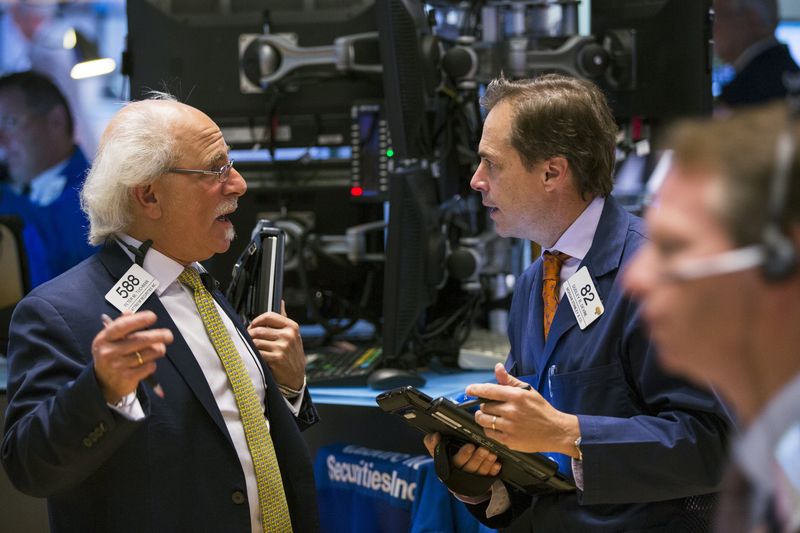Investing.com - Fresh comments from Federal Reserve Chair Janet Yellen will top the agenda for global financial markets in the week ahead, as they look for further hints on the timing of the next rate hike.
Investors will also keep an eye out on a few U.S. economic reports, with Friday's monthly employment data in the spotlight, to gauge how it will impact the Fed's view on monetary policy in the coming months.
Meanwhile, market players will focus on remarks from European Central Bank President Mario Draghi for fresh clues on when the central bank will shift away from its ultra-easy policy.
In the U.K., traders will focus on a trio of reports on activity in the manufacturing, construction and services sectors for further indications on the continued effect that the Brexit decision is having on the economy.
A monetary policy announcement from the Reserve Bank of Australia will also be in focus.
Elsewhere, markets in China will remain closed this week due to the Golden Week holiday, which could affect liquidity conditions.
Ahead of the coming week, Investing.com has compiled a list of the five biggest events on the economic calendar that are most likely to affect the markets.
1. Fed Chair Yellen Speaks
After signaling that it still intends to raise rates in December last week, the Fed is keeping itself in the market's sights, with Chair Janet Yellen due to deliver a speech at a community banking conference hosted by the Federal Reserve Bank of St. Louis at 3:15PM ET (1915GMT) Wednesday.
Her comments will be monitored closely for any new insight on policy. Last week, Yellen said that the central bank plans to continue gradual rate hikes despite broad uncertainty about the path of inflation.
Investors viewed her comments as hawkish, which suggested that the Fed would raise rates in December, with further increases to follow in 2018.
The U.S. central bank has already raised rates twice this year.
Besides Yellen, this week will also see comments from a handful of Fed speakers including influential New York Fed President William Dudley, Dallas Fed chief Robert Kaplan and Philadelphia Fed President Patrick Harker.
Comments from Governor Jerome Powell could take on extra importance after reports surfaced on Friday that he had met with U.S. President Donald Trump to discuss his potential nomination as the next Fed chair when Yellen's term ends in February.
Kevin Warsh, a former Fed governor, has increasingly been seen as a leading contender for the job. Warsh, who has a Wall Street and government background, is viewed by the market as hawkish and is regarded as someone who would be more interested in deregulation.
2. U.S. Employment Report
The U.S. Labor Department will release its September nonfarm payrolls report at 8:30AM ET (1230GMT) on Friday.
The consensus forecast is that the data will show jobs growth of just 100,000 this month, slowing from an increase of 156,000 in August, as the impact of Hurricanes Harvey and Irma are felt. The unemployment rate forecast to hold steady at 4.4%.
Most of the focus will likely be on average hourly earnings figures, which are expected to rise 0.2% after gaining 0.1% a month earlier.
An upbeat employment report will point to an improving economy and support the case for higher interest rates in the coming months, while a weak report would add to uncertainty over the economic outlook and push prospects of tighter monetary policy further off the table.
This week's calendar also features reports on ISM manufacturing and service sector growth, auto sales, ADP private sector payrolls, weekly jobless claims, monthly trade figures as well as factory orders.
Investors are also likely to continue to monitor the latest headlines coming out of Washington in regard to tax and healthcare reform.
3. ECB President Draghi Delivers Comments
European Central Bank President Mario Draghi is due to deliver opening remarks at the Inauguration of the ECB Visitor Center, in Frankfurt on Wednesday at 1715GMT (1:15PM ET).
Staying on the central bank front, the ECB will publish the minutes of its September 7 policy meeting at 1130GMT (7:30AM ET) Thursday.
Draghi indicated last month that the ECB could start tapering its massive stimulus program as early as October.
Meanwhile, Catalans are scheduled to vote in an independence referendum on Sunday. The referendum, declared illegal by Spain's central government, has thrown the country into its worst constitutional crisis in decades and raised fears of street violence as a test of will between Madrid and Barcelona plays out.
4. U.K. PMI's
The U.K. will release readings on September manufacturing sector activity at 0830GMT (4:30AM ET) on Monday, followed by a report on the construction sector on Tuesday and the service sector on Wednesday.
The manufacturing PMI is forecast to dip to 56.4 from 56.9 a month earlier, construction activity is expected to weaken slightly to 50.8 from 51.1, while a survey on Britain's giant services sector is forecast to hold steady at 53.2.
Data released last week showed Britain's economy grew at its slowest pace since 2013 in the 12 months after last year's Brexit vote, painting a subdued picture as the Bank of England prepares to raise interest rates for the first time in a decade.
The BoE said in September that it was likely to raise borrowing costs in the months ahead if the economy and price pressures kept growing.
5. Reserve Bank of Australia Policy Meeting
The RBA's latest interest rate decision is due on Tuesday at 0430GMT (12:30AM ET).
Most economists expect the central bank to keep rates unchanged at the current record-low of 1.5% for the 13th straight meeting and maintain its neutral policy stance, as it balances the risk of fueling further borrowing in the country's red-hot property market against tepid inflation.
Besides the RBA, data on retail sales and the trade balance should also capture some attention.
Stay up-to-date on all of this week's economic events by visiting: http://www.investing.com/economic-calendar/
